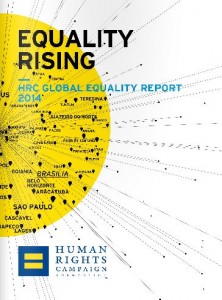 WASHINGTON – The Human Rights Campaign (HRC) Foundation has released the inaugural edition of Equality Rising—a brief overview of many of the successes and setbacks of LGBT activists, advocates, and allies around the world in 2013. Released in advance of the International Day Against Homophobia and Transphobia on May 17th, this report aims to educate the American public about many of the notable events from last year in the growing global equality movement. A copy of the report is available at www.hrc.org/equalityrising.
WASHINGTON – The Human Rights Campaign (HRC) Foundation has released the inaugural edition of Equality Rising—a brief overview of many of the successes and setbacks of LGBT activists, advocates, and allies around the world in 2013. Released in advance of the International Day Against Homophobia and Transphobia on May 17th, this report aims to educate the American public about many of the notable events from last year in the growing global equality movement. A copy of the report is available at www.hrc.org/equalityrising.
“Despite entrenched homophobia and transphobia in many nations around the world, the global fight for LGBT equality made historic gains in 2013,” said Ty Cobb, director of global engagement for the Human Rights Campaign Foundation. “At the same time, last year included horrific new anti-LGBT laws as well as alarming trends in anti-LGBT harassment and violence. These serve as important reminders of the many challenges ahead and the tremendous amount of work left to be done.”
Equality Rising highlights victories for full marriage equality in five nations, progress in the fight for transgender equality on at least four continents, as well as increased LGBT visibility broadly and tremendous acts of courage in nations as dangerous for LGBT people as Iran. The report also documents new anti-LGBT laws, ongoing persecution and violence, and efforts by extreme anti-LGBT Americans to export hateful rhetoric and misinformation abroad.
A few highlights from the report include:
- More nations—Brazil, France, New Zealand, England and Wales in the United Kingdom, and Uruguay—opened the doors to marriage equality in 2013 than any year in history. These victories brought the total number of nations extending full marriage rights to all of its citizens to 16.
- Although millions of transgender people around the world remain frequent targets for discrimination, at least eight nations on four continents took tangible steps toward greater equality for transgender and intersex citizens.
- LGBT people have become more visible globally that ever before—in the workplace, on television, and running for office at the local, state, and national levels and winning.
- Nigeria, Russia, and Uganda passed laws in 2013 that inhibited the freedom of speech and association of LGBT people and their allies, with the law in Uganda allowing for life imprisonment as a punishment for “aggravated homosexuality”.
- In more than 80 countries, LGBT people are considered criminals for simply being who they are. They are frequently demonized for political gain, and they remain targets of harassment, arrest, violence, and in some cases, torture.
Over the last several months, HRC has also focused on exposing Americans who are exporting anti-LGBT bigotry and promoting discriminatory laws in other nations. This includes reporting on American extremist Scott Lively’s advocacy in Uganda, Eastern Europe and around the world, and highlighting the roles of the National Organization for Marriage, the Family Research Institute, and the World Congress of Families in advancing anti-LGBT legislation in Russia.
“We’re increasingly seeing the fingerprints of American ant-LGBT extremists in many more nations. They’re exporting hate to countries on nearly every continent, and they’ve had a real impact where the global equality movement has experienced its greatest setbacks—Nigeria, Russia, and Uganda,” said Cobb.
Equality Rising comes on the heels of last year’s announcement of HRC Foundation’s global engagement program, which is dedicated to joining advocates around the world in advancing global equality. The program aims to do so by educating Americans on the human rights of LGBT people around the world; exposing the work of prominent anti-gay American organizations that have pushed anti-gay laws and legislation overseas; leveraging its relationships with American policymakers, faith communities, corporations and other change agents to help protect the human rights of LGBT people abroad; and providing fellowships at HRC for foreign LGBT advocates.











